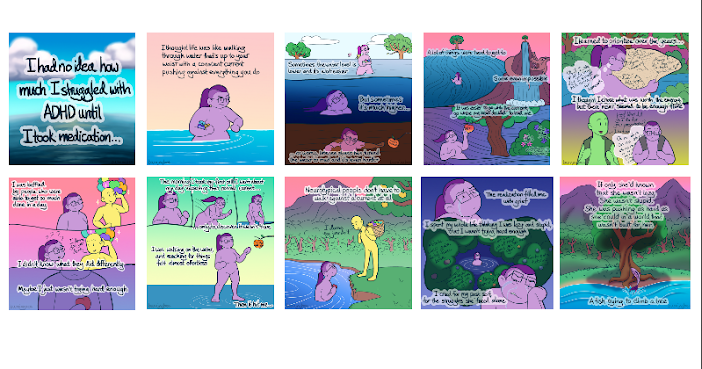Deep gratitude this week to Dr. Sony Biradar for a thought-provoking Grand Rounds presentation on Neurodiversity in Medical Education. It was one of those presentations that sticks with you all day, makes you wonder if maybe you've been thinking about things incorrectly for a long time. I recommend watching the recording if you or someone you love identifies as neurodivergent OR if you work with or supervise someone who does.
A link to the recording will be available HERE.
Here are some key take homes:
- Neurotypical describes someone whose cognition is aligned with societal norms, i.e. whose brain functions are considered usual or expected by society.
- Neurodivergence describes someone whose cognition and processing are different than "the societal norm".
- Some neurodivergent people have an associated diagnosis (e.g. ADHD, autism), but not all.
- 15-20% of the population is neurodivergent
- Neurodivergent people suffer high rates of unemployment, have disproportionate rates of anxiety, depression and risk of suicide
Dr. Biradar spent a fair amount of time talking about the idea of disability as a social construct -- first, that neurodivergence has long existed in society and may even have some developmental benefits that has ensured its persistence. In the medical model of disability (one which we are all a part of), impairments that affect one's quality of life need to be "fixed". In contrast, in the social model of disability, conditions are themselves not a disability, it is societal structures that make them disabling.
The prevalence of neurodiversity in medical training has not been well-studied, nor has the experience of students and trainees. Dr. Biradar posits that certain adaptive behaviors/challenges may be heightened in neurodivergent trainees:
- masking: trying to hide one's neurodivergence may lead to increased exhaustion, higher rates of burnout, and even increased suicidality
- hidden curriculum (socialization that happens for trainees when what they see differs from what is said/what they are taught)
- imposter syndrome: may be increased for neurodivergent trainees
- double empathy: a type of stereotype threat. . .
- otherness: when trainees feel different from the norm, this may impact their ability to learn and perform
Dr. Biradar talked about how the process of moving through residency training-- acquiring knowledge and skills from attendings -- may simply be more challenging for neurodivergent trainees simply because the way they work/think is, by definition, different from the "medical norm".
Residency training is known to be intense, overwhelming, and stressful. The inputs are numerous.
Experiencing this level of stress as a neurodivergent learner may be particularly overwhelming. Don't forget intersectionality, Dr. Biradar cautions, for we know that other identities (namely BIPOC learners already experience these
What can we do? How do we support neurodivergent learners?
Start with being strength-based, says Dr. Biradar. Look for ways to help learners demonstrate their strengths, do not just focus on their deficits. Also, consider the theory of multiple intelligences-- different ways that learners learn and acquire new information (oral, visual, audio, reading, etc). Offer multiple options. Promote psychological safety in your learning environment, as well as mentorship. Also encourage and promote increased neurodiversity in leadership and encourage community.
Finally, consider the concept of compassionate pedagogy, asks us to be critical of institutional and cultural practices in medical training. Compassionate pedagogy is a collection of teaching practices designed to foster human connection, communication, and wellbeing. The approach revolves around listening to students’ lived experiences and offering flexibility to accommodate their struggles. If we want our students to learn well, we need to honor the often imperfect way they show up.
Dr. Biradar closed her presentation with the comic below, which captures some of the challenges of neurodivergent learners -- and the potential benefit of medication treatment for some conditions (in this case ADHD).
AoME Insights Embracing Neurodiversity in our Healthcare Educators 29 March 2023. (2023). Academy of Medical Educators.
https://www.youtube.com/watch?v=Ugx2WjkKvSI
Duong D, Vogel L. Untapped potential: embracing neurodiversity in medicine. CMAJ. 2022 Jul 18;194(27):E951-E952. doi:
10.1503/cmaj.1096006. PMID: 35851534; PMCID: PMC9299741.
Fung, L.K. & Doyle, N. (2021). Neurodiversity. The new diversity. In: Neurodiversity. From Phenomenology to Neurobiology and
Enhancing Technologies.
Goldberg H. Unraveling Neurodiversity: Insights from Neuroscientific Perspectives. Encyclopedia. 2023; 3(3):972-980.
https://doi.org/10.3390/encyclopedia3030070
Hamilton LG, Petty S. Compassionate pedagogy for neurodiversity in higher education: A conceptual analysis. Front Psychol. 2023 Feb
16;14:1093290. doi: 10.3389/fpsyg.2023.1093290. Erratum in: Front Psychol. 2024 Feb 20;14:1345256. doi:
10.3389/fpsyg.2023.1345256. PMID: 36874864; PMCID: PMC9978378.
Robinson D. Neurodiversity in medical education: How can we improve postgraduate learning for neurodiverse doctors? Med Teach.
2022 May;44(5):564-566. doi: 10.1080/0142159X.2022.2039383. Epub 2022 Mar 2. PMID: 35236237.
Shaw SCK, Fossi A, Carravallah LA, Rabenstein K, Ross W, Doherty M. The experiences of autistic doctors: a cross-sectional study.
Front Psychiatry. 2023 Jul 18;14:1160994. doi: 10.3389/fpsyt.2023.1160994. PMID: 37533891; PMCID: PMC10393275.
Syharat CM, Hain A, Zaghi AE, Gabriel R, Berdanier CGP. Experiences of neurodivergent students in graduate STEM programs. Front
Psychol. 2023 Jun 15;14:1149068. doi: 10.3389/fpsyg.2023.1149068. PMID: 37397290; PMCID: PMC10311419.
Taylor G. Editorial: Embracing neurodiversity in medicine. Aust J Gen Pract. 2021 Mar;50(3):101. doi: 10.31128/AJGP-03-21-1234e.
PMID: 33634273.







No comments:
Post a Comment